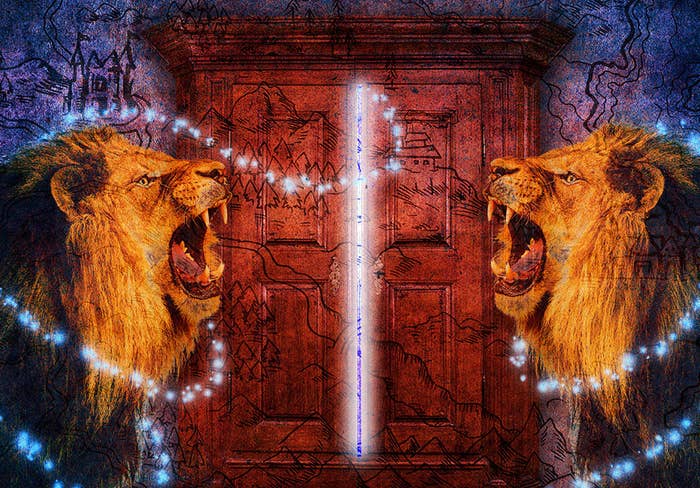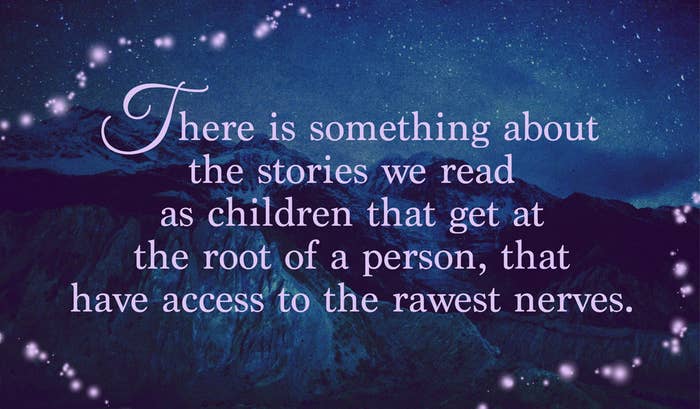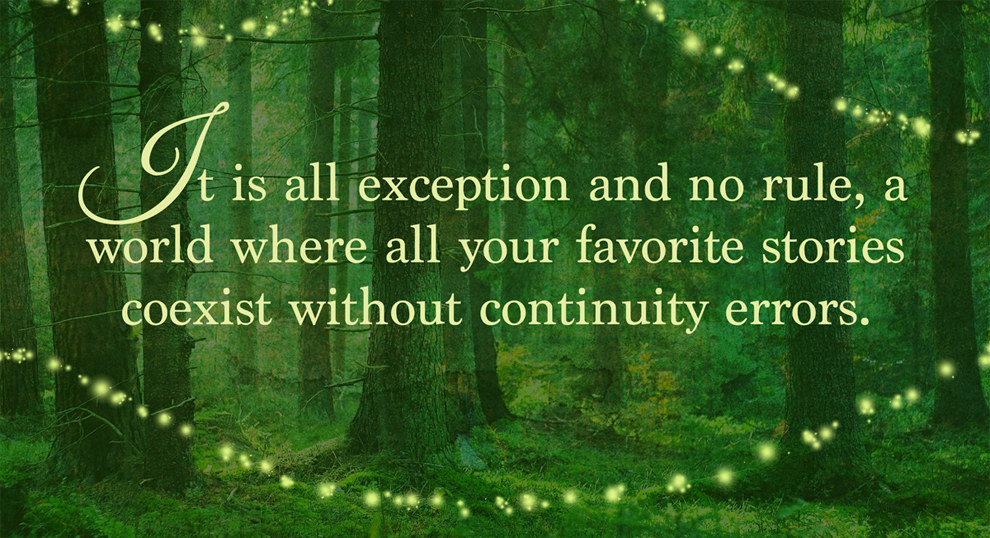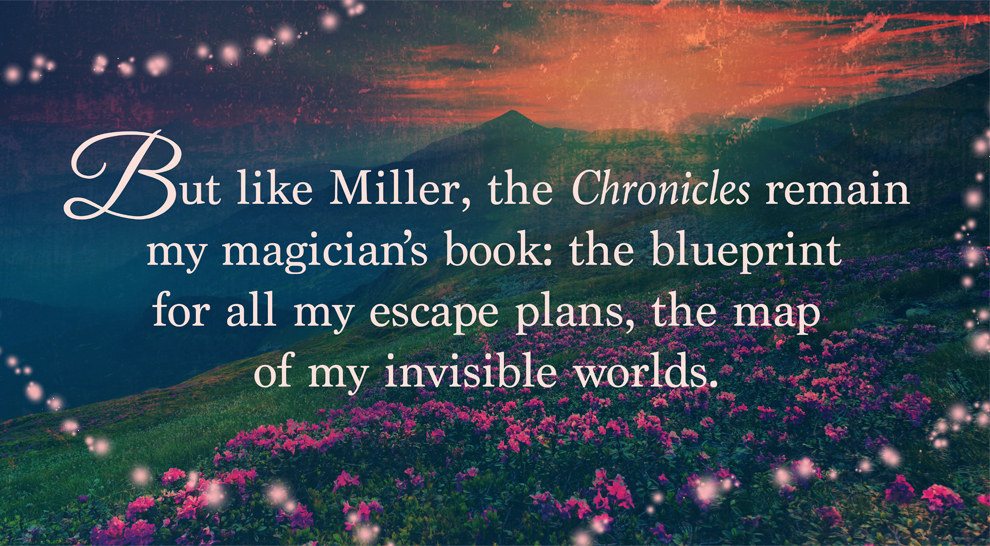
I made a study of it, the passage into other worlds. It started around age 10 — already I recognized the peril of adulthood when it came to magic — and as the years ticked by, 11 then 12 then 13, I counted each as a closing door. Like when schools or jobs neglect to send formal rejections, that nothing had happened to me (or around me) by a certain time confirmed that one or another story would not be having me for a protagonist.
There are few children who don't like a good escapist narrative: They are hallmarks of this body of literature. Both Perrault's and the Grimm brothers' fairy tales are full of children leaving home, whether they go running or are pushed out. Alice falls down a hole into Wonderland. Mary Lennox finds a key to a locked garden. The Darling children fly off to Neverland. James climbs into a giant piece of fruit. Harry finds himself at a new boarding school. There is something in these stories that children need, want: an imaginative trial of independence, a way out of life as they know it. For some children, though, they are more than that: They are life preservers.
I write as someone who was left behind, as anyone who has read and loved a magical book is, marooned in the world we tried so hard to escape. We are Narnians bereft of Narnia, witches without wands, children who have grown old. I do not mourn for my lost childhood: let me be clear. Adulthood is another, maybe equally profound, form of escape, and one I relish. Still, I've been thinking about this very particular form of reading—desperate, wishful, life-sustaining—that I for a long time had put aside.
Critic Laura Miller, in the wonderful Magician's Book: A Skeptic's Adventures in Narnia, likens her relationship with The Chronicles of Narnia, the foundational books of her childhood, to the character Lucy's encounter with a spell "for the refreshment of the spirit" in The Voyage of the Dawn Treader. In a volume of Coriakin's, a magician and former (or fallen) star, she finds an enchantment that is not so much spell as it is story. But the book's pages cannot be turned back (it is, after all, magical) and Lucy forgets it almost instantly. The memory of how it felt, though, stays with her, for "ever since that day what Lucy means by a good story is a story which reminds her of the forgotten story in the Magician's Book."
While Miller has "read a lot of great literature since the day my second-grade teacher handed me a clothbound copy of The Lion, the Witch and the Wardrobe," none are her magician's book, "the story to which all other stories must be compared." The Chronicles fill that role for her "not merely because of its form or style or historical significance but because of how it made me feel, which is at heart the fundamental question with any work of fiction."
When I think about how and when I read the Chronicles of Narnia in childhood, I have to start with my bed. For a brief moment in time, around age 7 or 8, I had a lovely four-poster bed, and on special occasions I'd make a tent of it. Spiriting sheets from the linen closet and securing them over the bed's top and sides with extra hairbands, I created a dimly lit box of fabric, a cave of what was to me the most delicious privacy, secrecy, comfort, safety. It was space I reserved for only the most important books, because of course what else would I do inside it but read? Narnia deserved, required this space; and it was there, closed up and away from the world, that I fell into a story I needed with every atom of my body.

I reread all seven books this past Christmas (when else) for the first time since childhood and I could not keep myself from crying, or crying out. I threw two, maybe three, of the books across the room.
There is something about the stories we read as children that get at the root of a person, that have access to the rawest nerves. And when these books are as aggressively enchanting, and as full of hard, cruel things, as the Chronicles are — ambivalence can be violent. Part of my distress was just the pain of seeing these children lose Narnia, one by one, and finally their own lives. Part of it was, well, all the shitty stuff. Perhaps the shittiest comes at the end of The Last Battle, when the Narnian prince Tirian notes Susan's conspicuous absence from her gathered siblings.
"My sister Susan," answered Peter shortly and gravely, "is no longer a friend of Narnia.""Yes," said Eustace, "and whenever you've tried to get her to come and talk about Narnia or do anything about Narnia, she says, 'What wonderful memories you have! Fancy your still thinking about all those funny games we used to play when we were children.'""Oh Susan!" said Jill. "She's interested in nothing nowadays except nylons and lipstick and invitations. She always was a jolly sight too keen on being grown-up."
This passage is even more frustrating next to one from the end of The Voyage of the Dawn Treader, when Aslan explains to Edmund and a sobbing Lucy that they cannot come back to Narnia again: "You are too old, children, and you must begin to come close to your own world now." What are nylons and lipstick — the uniform of 1950s femininity — if not the price a girl must pay to grow up in her own world? Polly, Digory Kirke's companion in The Magician's Nephew, goes on contest Susan's grown-up-ness:
"I wish she would grow up. She wasted all her school time wanting to be the age she is now, and she'll waste all the rest of her life trying to stay that age. Her whole idea is to race on to the silliest time of one's life as quick as she can and then stop there as long as she can."
I think of the age Susan must have been when she sought the White Stag with her siblings in the Lantern Waste, and I think it must be that same age that this Susan is accused of trying to freeze in time. Is it any wonder she would want to return to the hour of life when she was Queen of Narnia, not as a child but as a woman, for as long as she could?
Contradictory messaging aside (Lewis, in the Chronicles, is anything but consistent), this is a profound betrayal of Susan, and of the story itself. Author Neil Gaiman and fan-fiction writer E. Jade Lomax have both memorably taken up this question, in part because it's the sort of egregious wound that demands stitching up. Gaiman upends Lewis' rejection of adult femininity by inserting a White Witch–Aslan sex scene (yes) and Lomax has Susan kissing boys and kissing girls and losing her virginity on a Spanish beach.
Both writers, curiously, have Susan become one too. In Gaiman's version, Susan becomes a professor of children's literature, another Lewis, another Kirke. In Lomax's, Susan writes incendiary political columns under the penname Frank Tumnus, a name she picked because she thought it would have made her youngest brother, her dead brother, laugh.
I don't think we talk enough about how they all die at the end.
When I was 7 or 8, my favorite book was The Last Battle: I loved seeing everyone together again. Of course no one I loved had yet died. This would change.
The Chronicles of Narnia is a layer cake of desire, of belief, each laid one over the other. Imagine a Christian realm full of creatures of Greek (dryads, fauns, Bacchus) and German (dwarves, giants) myth. Imagine a Christ who is not Christ but a lion. A lion. (That is a pretty big leap, let's acknowledge it.) Imagine the language of 20th-century school children ("That's a real brain-wave, Pole") rubbing up with that of Gawain and the Green Knight ("My Lady is a nosegay of all virtues"). Imagine a pre-industrial society with sewing machines. Imagine a wild, animal realm where everyone takes tea and Santa still exists. Imagine a lone, lit street lamp in the middle of a dark, snowy wood.
This is all to say that none of this makes sense. It is all exception and no rule, a world where all your favorite stories coexist without continuity errors. Even in heaven, in those last horrible/tortuous/beautiful pages of The Last Battle, Professor Kirke, now "the Lord Digory," murmurs under his breath (maybe because he knows how sacrilegious it is), that the afterlife is "all in Plato, all in Plato: bless me." This is an Oxford don having his cake and eating it too.

There are also heartening exceptions, revisions, to traditional gender roles in the Chronicles. Lucy, clearly, is the heart of the series—their true protagonist. She and Susan and Jill all employ martial skills throughout the books, if not consistently: Lucy fights in The Horse and His Boy, Susan wins the archery contest in Prince Caspian, and Jill is called "the bravest and most wood-wise" of Tirian's subjects in The Last Battle. (She is "also the most malapert and disobedient.") Aravis's first appearance in The Horse and His Boy is in her brother's armor. And finally, it is Digory's irresistible curiosity (not Polly's) that serves as the original sin of the series, freeing the evil queen Jadis and bringing her to Narnia, where she will eventually become the White Witch. A boy is the Chronicles' Eve.
On the point of the White Witch and the Lady of the Green Kirtle, while they are thoroughly, completely evil—for a lot of traditionally feminine reasons—they are also thoroughly, completely awesome. I'm reminded a little of the moment in The Fellowship of the Ring (by Lewis's friend and fellow-Inkling member, who personally never liked the Chronicles very much) when Galadriel contemplates the gift of the One Ring.
"In place of the Dark Lord you will set up a Queen. And I shall not be dark, but beautiful and terrible as the Morning and the Night! Fair as the Sea and the Sun and the Snow upon the Mountain! Dreadful as the Storm and the Lightning! Stronger than the foundations of the earth. All shall love me and despair!"
When Edmund first sees the White Witch in The Lion, the Witch and the Wardrobe, she is:
[...] a great lady, taller than any woman that Edmund had ever seen. She also was covered in white fur up to her throat and held a long straight golden wand in her right hand and wore a golden crown on her head. Her face was white—not merely pale, but white like the snow or paper or icing-sugar, excerpt for her very red mouth. It was a beautiful face in other respects, but proud and cold and stern.
I mean, this is a woman who battled Father Christmas for what might be centuries and won. The kind of power Jadis and the Lady of the Green Kirtle have is intoxicating (literally—beware their food, their music), and while I still root against them I relish their appearances, the power they wield.
Anyone who has read the Chronicles of Narnia before first trying Turkish delight is doomed to disappointment. This would be true regardless of what she offered Edmund: chocolate, ice cream, fruit. Nothing would taste right.
The other great heartbreaker of the Chronicles is Calormen: a textbook Orientalist empire boiled down from The Arabian Nights, Lewis' fear of strong flavors, and a smug sense of Celtic superiority. Some of the Calormenes' dialogue verges on minstrelsy: "This boy is manifestly no son of yours," a Tarkaan (lord) says to Shasta's adopted father, "for your cheek is as dark as mine but the boy is fair and white like the accursed but beautiful barbarians who inhabit the remote North." ("Accursed but beautiful" is basically what we all want our enemies to say about us, right?) The Narnians are consistently described this way: fair, white, beautiful, beautiful, beautiful. The people and landscapes of Calormen have allure too, but their charms fade on closer inspection. "What you would chiefly have noticed if you had been there was the smells, which came from unwashed people, unwashed dogs, scent, garlic, onions, and the piles of refuse which lay everywhere."
The smell of onions and garlic will accompany nearly every appearance of the Calormenes in the Chronicles, along with the unforgivable symbols of their greed and lust: slaves and child brides. It's unsurprising that, by The Last Battle, Lewis let the dwarves call them "Darkie."
There's a moment in that last book where an honorable young Calormene lord, Emeth, wanders around heaven looking for his god Tash. Emeth, with Aravis, are held up as examples of "good" Calormenes, the series' black friends, and so prove that Lewis cannot have written racist things. Tash, by the way, is a giant, black, multi-armed vulture god. Emeth finds Aslan instead, who tells him that "all the service thou hast done to Tash, I account as service done to me … For I and he are of such different kinds that no service which is vile can be done to me, and none which is not vile can be done to him."
Earlier Peter banishes the "terrible figure" of Tash, who appears with a bad guy caught under one arm, in pseudo-exorcist language: "Begone, Monster, and take your lawful prey to your own place: in the name of Aslan." This "lawful" apportioning of the vile to the most vile in The Last Battle mirrors that of unrepentant sinners to the greatest sinner in Christianity. It follows that Tash is not merely some terrifying avatar of a religion the Narnians do not understand but in fact a Narnian devil. The Calormenes, then, are not merely pagans, but Satanists.
Lewis softens this blow by rejiggering the requirements for salvation. Though it feels small, simple, logical — that a good man like Emeth gets to go to heaven — it's a profound shift from Christian dogma, where the recognition in life of the savior (in this case a giant, if magnificent, cat) is absolutely necessary for salvation. Miller agrees: "[T]he Christianity in Narnia has been substantially, rather than just superficially, transformed — to the point of being much less Christian, perhaps, than Lewis intended."
"Of course," Miller says elsewhere, "it's absurd to speak of the 'politics' of Narnia. They are children's fantasies, not designed to address such adult concerns as class systems, nationalism, and economics. They take place in a dream world."
It's true the economies, if you tried to map them out, of Narnia are impossible, absurd. (We return again to the subject of sewing machines.) But these other kinds of politics — of class, of nation, of gender, of race — are ones that are intimately felt by the children who inhabit these books, and more especially by the children who read them. The fantasies of childhood, as much as in adulthood, are circumscribed by gender and class and race. What does Lewis ask of his girl readers when he dismisses Susan from paradise? What does Lewis ask of his readers of color when dark skin is equated with squalor and tyranny? It hurts, even (especially) as children, to be shown so clearly you don't belong.
But this is the Chronicles' greatest, redeeming strength: that sowed within are the seeds of their own dogma's destruction. The machinery, the logic, of Narnia itself resists its author's heavy-handed lessons. Though Lewis pushes Susan out of heaven, he cannot take back the founding tenet of the series — that "once a king or queen of Narnia, always a king or queen of Narnia" — which is truer than her absence. The commonplace wisdom of "jolly decent" and "jolly rotten" ways of being in the world that transcend gender and culture and age and even species manages to overthrow, in a short aside, the very Christianity Lewis tries to spoonfeed his readers with. Goodness, not faith, rules. The mean-spirited, bigoted, and pedantic pieces of the books still exist, but in fundamental tension with Narnia itself. The Chronicles, I believe, have a will of their own.

I have carried with me, even as the books gathered dust on my shelves, the small, perfect things — baubles of joy — that make Narnia one of the most yearned for of other worlds. For "in Narnia your good clothes were never your uncomfortable ones." And the meals! Though abominable to think of a cuisine without garlic and onions, there are few writers who capture the joy of food so viscerally. ("There's nothing to beat good freshwater fish if you eat it when it has been alive half an hour ago and has come out of the pan half a minute ago.") I love and still think about the ocean of fresh, sweet water, carpeted by flowers, that lies at the edge of the world. The delightfully odious diary Eustace keeps aboard the Dawn Treader ("a rotten little tub"). The plantlike gems and fire-voiced salamanders in the molten realm of Bism. Puddleglum and Reepicheep everywhere all the time. The ride Lucy and Susan take atop Aslan's back to free the White Witch's prisoners. The restful, protean wood between the worlds. Everyone's insistence on sword cleanliness. Each time Lucy finds Tumnus again, in life and in death. The pleasure they all take in each other.
I didn't discover that Aslan was meant to be Jesus until I was in high school, working at a Books-a-Million. I had known for several years that there was some kind of barely hidden message in the Chronicles, but I was too proud to ask and too invested in the stories to see them with any broad clarity. I found the answer in an introduction to a new omnibus of the books, and felt not betrayed but disappointed, for how very dull a solution it was. It didn't poison the books for me, but it marked them as, well, less magical than I had remembered. I found respite in other stories.
But like Miller, the Chronicles remain my magician's book: the blueprint for all my escape plans, the map of my invisible worlds. I'm lucky enough to be able to return to them (unlike poor Lucy), even if that sometimes means hurling one across the room.
As I reread the books this winter, which was a particularly long and cold one, I found myself seeing Narnia everywhere: in the snowy woods beside the highway, in the snow-laden hiking trails nearby my house. And as I drove into the white-flecked black, the yawning emptiness of western Massachusetts's unlit back roads, I would tell myself that I shouldn't be scared, because this was how one got to Narnia. The smallest part of me still believed — that my calculations were wrong, that I was not too old, that this was the moment, finally, now.
***
Molly McArdle's fiction and nonfiction has appeared in The Believer, The Los Angeles Review of Books, and PANK, among other places. She runs The Rumpus' Tumblr (The Rumblr), and can be found on Twitter and Tumblr. She is working on a novel at the University of Massachusetts, Amherst.
